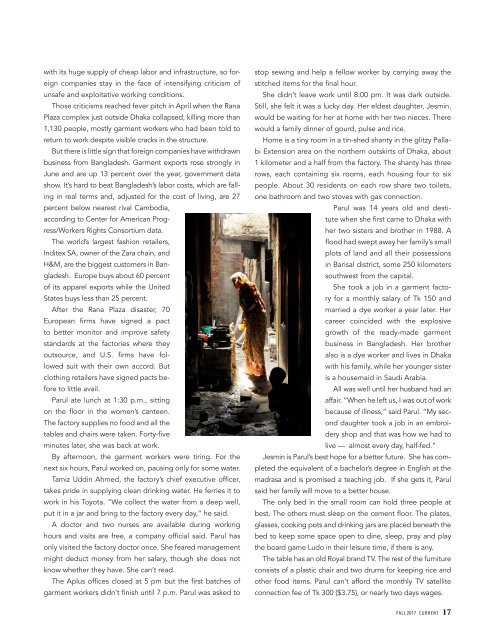Current Magazine
You also want an ePaper? Increase the reach of your titles
YUMPU automatically turns print PDFs into web optimized ePapers that Google loves.
with its huge supply of cheap labor and infrastructure, so foreign<br />
companies stay in the face of intensifying criticism of<br />
unsafe and exploitative working conditions.<br />
Those criticisms reached fever pitch in April when the Rana<br />
Plaza complex just outside Dhaka collapsed, killing more than<br />
1,130 people, mostly garment workers who had been told to<br />
return to work despite visible cracks in the structure.<br />
But there is little sign that foreign companies have withdrawn<br />
business from Bangladesh. Garment exports rose strongly in<br />
June and are up 13 percent over the year, government data<br />
show. It’s hard to beat Bangladesh’s labor costs, which are falling<br />
in real terms and, adjusted for the cost of living, are 27<br />
percent below nearest rival Cambodia,<br />
according to Center for American Progress/Workers<br />
Rights Consortium data.<br />
The world’s largest fashion retailers,<br />
Inditex SA, owner of the Zara chain, and<br />
H&M, are the biggest customers in Bangladesh.<br />
Europe buys about 60 percent<br />
of its apparel exports while the United<br />
States buys less than 25 percent.<br />
After the Rana Plaza disaster, 70<br />
European firms have signed a pact<br />
to better monitor and improve safety<br />
standards at the factories where they<br />
outsource, and U.S. firms have followed<br />
suit with their own accord. But<br />
clothing retailers have signed pacts before<br />
to little avail.<br />
Parul ate lunch at 1:30 p.m., sitting<br />
on the floor in the women’s canteen.<br />
The factory supplies no food and all the<br />
tables and chairs were taken. Forty-five<br />
minutes later, she was back at work.<br />
By afternoon, the garment workers were tiring. For the<br />
next six hours, Parul worked on, pausing only for some water.<br />
Tamiz Uddin Ahmed, the factory’s chief executive officer,<br />
takes pride in supplying clean drinking water. He ferries it to<br />
work in his Toyota. “We collect the water from a deep well,<br />
put it in a jar and bring to the factory every day,” he said.<br />
A doctor and two nurses are available during working<br />
hours and visits are free, a company official said. Parul has<br />
only visited the factory doctor once. She feared management<br />
might deduct money from her salary, though she does not<br />
know whether they have. She can’t read.<br />
The Aplus offices closed at 5 pm but the first batches of<br />
garment workers didn’t finish until 7 p.m. Parul was asked to<br />
stop sewing and help a fellow worker by carrying away the<br />
stitched items for the final hour.<br />
She didn’t leave work until 8:00 pm. It was dark outside.<br />
Still, she felt it was a lucky day. Her eldest daughter, Jesmin,<br />
would be waiting for her at home with her two nieces. There<br />
would a family dinner of gourd, pulse and rice.<br />
Home is a tiny room in a tin-shed shanty in the glitzy Pallabi<br />
Extension area on the northern outskirts of Dhaka, about<br />
1 kilometer and a half from the factory. The shanty has three<br />
rows, each containing six rooms, each housing four to six<br />
people. About 30 residents on each row share two toilets,<br />
one bathroom and two stoves with gas connection.<br />
Parul was 14 years old and destitute<br />
when she first came to Dhaka with<br />
her two sisters and brother in 1988. A<br />
flood had swept away her family’s small<br />
plots of land and all their possessions<br />
in Barisal district, some 250 kilometers<br />
southwest from the capital.<br />
She took a job in a garment factory<br />
for a monthly salary of Tk 150 and<br />
married a dye worker a year later. Her<br />
career coincided with the explosive<br />
growth of the ready-made garment<br />
business in Bangladesh. Her brother<br />
also is a dye worker and lives in Dhaka<br />
with his family, while her younger sister<br />
is a housemaid in Saudi Arabia.<br />
All was well until her husband had an<br />
affair. “When he left us, I was out of work<br />
because of illness,” said Parul. “My second<br />
daughter took a job in an embroidery<br />
shop and that was how we had to<br />
live — almost every day, half-fed.”<br />
Jesmin is Parul’s best hope for a better future. She has completed<br />
the equivalent of a bachelor’s degree in English at the<br />
madrasa and is promised a teaching job. If she gets it, Parul<br />
said her family will move to a better house.<br />
The only bed in the small room can hold three people at<br />
best. The others must sleep on the cement floor. The plates,<br />
glasses, cooking pots and drinking jars are placed beneath the<br />
bed to keep some space open to dine, sleep, pray and play<br />
the board game Ludo in their leisure time, if there is any.<br />
The table has an old Royal brand TV. The rest of the furniture<br />
consists of a plastic chair and two drums for keeping rice and<br />
other food items. Parul can’t afford the monthly TV satellite<br />
connection fee of Tk 300 ($3.75), or nearly two days wages.<br />
FALL 2017 CURRENT 17





